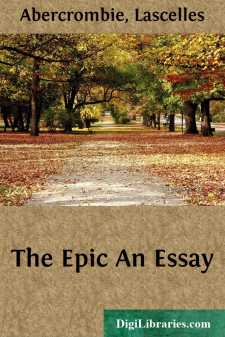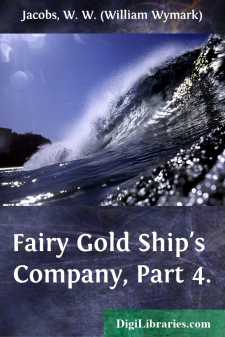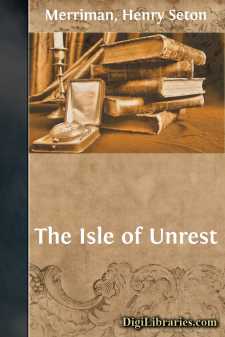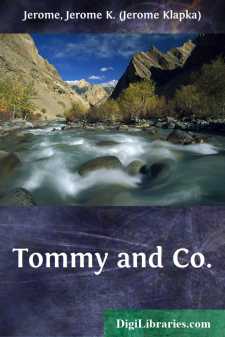Fiction
- Action & Adventure 180
- Biographical 15
- Christian 59
- Classics 6965
- Coming of Age 5
- Contemporary Women 3
- Erotica 8
- Espionage/Intrigue 12
- Fairy Tales, Folklore & Mythology 236
- Family Life 169
- Fantasy 117
- Gay 1
- General 596
- Ghost 32
- Historical 808
- Horror 43
- Humorous 160
- Jewish 25
- Legal 4
- Medical 22
- Mystery & Detective 315
- Political 49
- Psychological 41
- Religious 64
- Romance 159
- Sagas 11
- Science Fiction 730
- Sea Stories 113
- Short Stories (single author) 537
- Sports 10
- Suspense 1
- Technological 8
- Thrillers 2
- Urban Life 31
- Visionary & Metaphysical 1
- War & Military 173
- Westerns 199
Fiction Books
Sort by:
I.BEGINNINGSThe invention of epic poetry corresponds with a definite and, in the history of the world, often recurring state of society. That is to say, epic poetry has been invented many times and independently; but, as the needs which prompted the invention have been broadly similar, so the invention itself has been. Most nations have passed through the same sort of chemistry. Before their hot racial...
more...
The Wizard's Daughter There had been a norther during the day, and at sunset the valley, seen from Dysart's cabin on the mesa, was a soft blur of golden haze. The wind had hurled the yellow leaves from the vineyard, exposing the gnarled deformity of the vines, and the trailing branches of the pepper-trees had swept their fallen berries into coral reefs on the southerly side. A young man with...
more...
by:
Elinor Glyn
CHAPTER I People often wondered what nation the great financier, Francis Markrute, originally sprang from. He was now a naturalized Englishman and he looked English enough. He was slight and fair, and had an immaculately groomed appearance generally—which even the best of valets cannot always produce. He wore his clothes with that quiet, unconscious air which is particularly English. He had no...
more...
by:
Upton Sinclair
CHAPTER I "Samuel," said old Ephraim, "Seek, and ye shall find." He had written these words upon the little picture of Samuel's mother, which hung in that corner of the old attic which served as the boy's bedroom; and so Samuel grew up with the knowledge that he, too, was one of the Seekers. Just what he was to seek, and just how he was to seek it, were matters of...
more...
by:
Ned Buntline
CHAPTER I.THE AVENGER. "Bill! Wild Bill! Is this you, or your ghost? What, in great Creation's name, are you doing here?" "Gettin' toward sunset, old pard–gettin' toward sunset, before I pass in my checks!" The first speaker was an old scout and plainsman, Sam Chichester by name, and he spoke to a passenger who had just left the west-ward-bound express train at Laramie,...
more...
FAIRY GOLD "Come and have a pint and talk it over," said Mr. Augustus Teak. "I've got reasons in my 'ead that you don't dream of, Alf." Mr. Chase grunted and stole a side-glance at the small figure of his companion. "All brains, you are, Gussie," he remarked. "That's why it is you're so well off." "Come and have a pint," repeated the...
more...
THE PASSING OF TONY. "Last mail in, Mis' Bascomb?" "Last mail's in, Tony." "Be there anything for me to-night?" Widow Bascomb knew perfectly well there was not, but she reached for a small pile of letters in a pigeonhole on her right and glanced over them rapidly. Her sour visage and rasping voice softened perceptibly as she smiled on the little old man before her....
more...
WHAT THIS MEANS TO YOU This means that if you work in some factory, shop, mine, mill, J. store, office, or almost any other kind of business or industry, you will be earning benefits that will come to you later on. From the time you are 65 years old, or more, and stop working, you will get a Government check every month of your life, if you have worked some time,(one day or more) in each of any 5 years...
more...
CHAPTER I. THE MOVING FINGER. "The Moving Finger writes; and, having writ,Moves on: nor all thy piety nor witShall lure it back to cancel half a line,Nor all thy tears wash out a word of it." The afternoon sun was lowering towards a heavy bank of clouds hanging still and sullen over the Mediterranean. A mistral was blowing. The last yellow rays shone fiercely upon the towering coast of Corsica,...
more...
“Come in!” said Peter Hope. Peter Hope was tall and thin, clean-shaven but for a pair of side whiskers close-cropped and terminating just below the ear, with hair of the kind referred to by sympathetic barbers as “getting a little thin on the top, sir,” but arranged with economy, that everywhere is poverty’s true helpmate. About Mr. Peter Hope’s linen, which was white though somewhat...
more...











